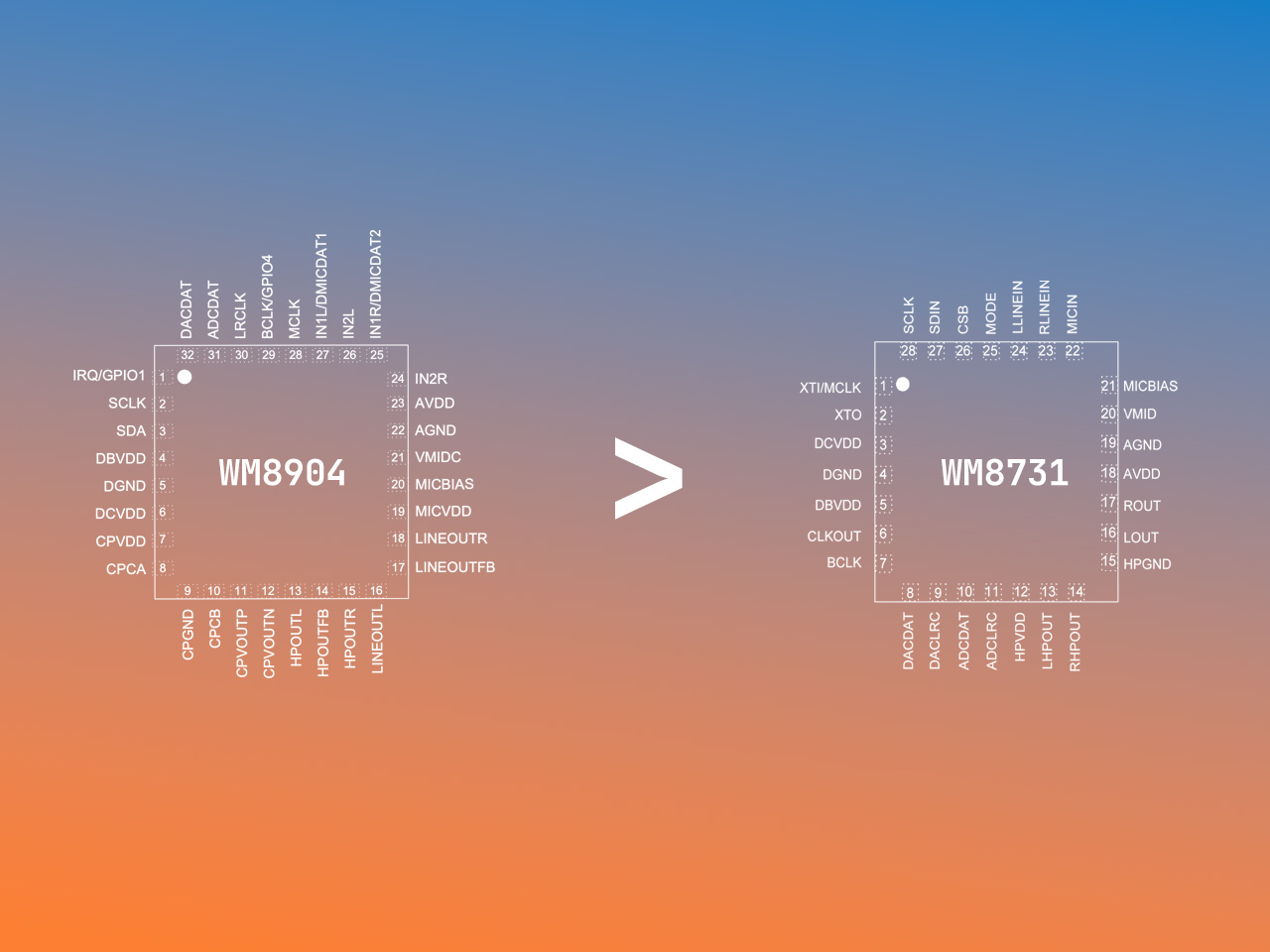KLST_PANDA + Audio Codec
 wow, this was a tour de force.
wow, this was a tour de force.
i was REALLY struggling with the new audio codec! i had moved on from WM87311 to WM8904 because WM8731 was discontinued by Cirrus Logic. and as so often in this world, the new audio codec is 1.000.000× more complex.
but to start at the end: WM8904 is now interfaced via I2C4 for configuration and SAI1 for audio data transfer. it is configured with the internal Frequency Locked Loop ( FLL ) but not the default startup sequence. STM32H7 SAI1 clock is set to 12.5MHz and adjusted to 12.288MHz via FLL.
one of my main problems was that of configuring the audio codec’s internal system clock. it took quite a bit of datasheet2 ( and forum ) digging to understand how to set it up. as far as i understood, some audio codec properties ( e.g FLL which makes sense ) can be configured without a proper internal system clock, while other require a properly configured clock.
Calculating FLL values
The FLL operating frequency, FVCO is set according to the following equation:
FVCO = (FREF x N.K x FLL_FRATIO) ( "FVCO must be in the range 90-100 MHz" )
FREF = 12500000Hz
FLL_FRATIO = 1MHz - 13.5MHz = 0h (divide by 1) = 0
The FLL output frequency is generated according to the following equation:
FOUT = (FVCO / FLL_OUTDIV)
FLL_OUTDIV = 11.25 MHz - 12.5 MHz = 000111 (divide by 8) = 7
FVCO = (FOUT x FLL_OUTDIV) = 12288000 8 = 98304000Hz
N.K = FVCO / (FLL_FRATIO x FREF) = 98304000Hz / ( 1 12500000Hz ) = 7.86432
K = 0.86432 * 65536 = 56644.07552 = 56644
N = 7
see chapter “FREQUENCY LOCKED LOOP (FLL)” ( WM8904 datasheet3, p104ff )
Starting Up WM8904
void setup_FLL() {
// FLL Disable
WM8904_write_register(WM8904_R116_FLL_CONTROL_1, 0x0000);
// FLL FOUT clock divider: 7=divide by 8
// FVCO clock divider: 0=divide by 1 TODO(not sure about this `4`)
WM8904_write_register(WM8904_R117_FLL_CONTROL_2, WM8904_FLL_OUTDIV(7) | WM8904_FLL_FRATIO(0));
// Fractional multiply for FREF
WM8904_write_register(WM8904_R118_FLL_CONTROL_3, WM8904_FLL_K(56644));
// Integer multiply for FREF
WM8904_write_register(WM8904_R119_FLL_CONTROL_4, WM8904_FLL_N(7));
// FLL Clock source: 0 = MCLK
// Frequency of the FLL: 0 = FVCO / 1
// FLL Clock Reference Divider: 0 = MCLK / 1 "... bring the reference down to 13.5MHz or below."
WM8904_write_register(WM8904_R120_FLL_CONTROL_5, WM8904_FLL_CLK_REF_SRC(0) | WM8904_FLL_CTRL_RATE(0) | WM8904_FLL_CLK_REF_DIV(0));
// FLL Fractional enable
// FLL Enable
WM8904_write_register(WM8904_R116_FLL_CONTROL_1, WM8904_FLL_FRACN_ENA | WM8904_FLL_ENA);
delay_ms(5);
}
void setup_peripherals() {
/* --- POWER ---------------------------------------------------------------------------------------------------- */
WM8904_write_register(WM8904_BIAS_CONTROL_0, WM8904_ISEL_HP_BIAS);
WM8904_write_register(WM8904_VMID_CONTROL_0, WM8904_VMID_BUF_ENA | WM8904_VMID_RES_FAST | WM8904_VMID_ENA);
delay_ms(5);
WM8904_write_register(WM8904_VMID_CONTROL_0, WM8904_VMID_BUF_ENA | WM8904_VMID_RES_NORMAL | WM8904_VMID_ENA);
WM8904_write_register(WM8904_BIAS_CONTROL_0, WM8904_ISEL_HP_BIAS | WM8904_BIAS_ENA);
WM8904_write_register(WM8904_POWER_MANAGEMENT_0, WM8904_INL_ENA | WM8904_INR_ENA);
WM8904_write_register(WM8904_POWER_MANAGEMENT_2, WM8904_HPL_PGA_ENA | WM8904_HPR_PGA_ENA);
WM8904_write_register(WM8904_DAC_DIGITAL_1, WM8904_DEEMPH(0));
WM8904_write_register(WM8904_ANALOGUE_OUT12_ZC, 0x0000);
WM8904_write_register(WM8904_CHARGE_PUMP_0, WM8904_CP_ENA);
WM8904_write_register(WM8904_CLASS_W_0, WM8904_CP_DYN_PWR);
/* --- AUDIO_INTERFACE ------------------------------------------------------------------------------------------ */
WM8904_write_register(WM8904_R25_AUDIO_INTERFACE_1, WM8904_AIF_WL_16BIT | WM8904_AIF_FMT_I2S);
WM8904_write_register(WM8904_R26_AUDIO_INTERFACE_2, 0);
WM8904_write_register(WM8904_R27_AUDIO_INTERFACE_3, 0);
WM8904_write_register(WM8904_R18_WM8904_POWER_MANAGEMENT_6, WM8904_DACL_ENA | WM8904_DACR_ENA | WM8904_ADCL_ENA | WM8904_ADCR_ENA);
delay_ms(5);
/* --- INPUT_OUTPUT --------------------------------------------------------------------------------------------- */
WM8904_write_register(WM8904_ANALOGUE_LEFT_INPUT_0, WM8904_LIN_VOL(0x10));
WM8904_write_register(WM8904_ANALOGUE_RIGHT_INPUT_0, WM8904_RIN_VOL(0x10));
WM8904_write_register(WM8904_ANALOGUE_HP_0, WM8904_HPL_ENA | WM8904_HPR_ENA);
WM8904_write_register(WM8904_ANALOGUE_HP_0, WM8904_HPL_ENA_DLY | WM8904_HPL_ENA | WM8904_HPR_ENA_DLY | WM8904_HPR_ENA);
WM8904_write_register(WM8904_DC_SERVO_0, WM8904_DCS_ENA_CHAN_3 | WM8904_DCS_ENA_CHAN_2 | WM8904_DCS_ENA_CHAN_1 | WM8904_DCS_ENA_CHAN_0);
WM8904_write_register(WM8904_DC_SERVO_1,
WM8904_DCS_TRIG_STARTUP_3 | WM8904_DCS_TRIG_STARTUP_2 | WM8904_DCS_TRIG_STARTUP_1 | WM8904_DCS_TRIG_STARTUP_0);
delay_ms(100);
/* --- HEADPHONES ----------------------------------------------------------------------------------------------- */
WM8904_write_register(WM8904_R90_WM8904_ANALOGUE_HP_0,
WM8904_HPL_ENA_OUTP | WM8904_HPL_ENA_DLY | WM8904_HPL_ENA | WM8904_HPR_ENA_OUTP | WM8904_HPR_ENA_DLY | WM8904_HPR_ENA);
WM8904_write_register(WM8904_ANALOGUE_OUT1_LEFT, WM8904_HPOUT_VU | WM8904_HPOUTL_VOL(0x39));
WM8904_write_register(WM8904_ANALOGUE_OUT1_RIGHT, WM8904_HPOUT_VU | WM8904_HPOUTR_VOL(0x39));
delay_ms(100);
}
void setup_SCLK_FLL() {
// select SYSCLK / fs ratio = 12288000Hz/48000Hz = 256 = 0b0011 = 3
// select Sample Rate (fs) = 44.1kHz, 48kHz = 0b101 = 5
WM8904_write_register(WM8904_R21_CLOCK_RATES_1, WM8904_CLK_SYS_RATE(3) | WM8904_SAMPLE_RATE(5));
// 0 = SYSCLK = MCLK
WM8904_write_register(WM8904_R20_CLOCK_RATES_0, 0x0000);
// SYSCLK Source Select to FLL output
// System Clock enable
// DSP Clock enable
WM8904_write_register(WM8904_R22_CLOCK_RATES_2, WM8904_SYSCLK_SRC | WM8904_CLK_SYS_ENA | WM8904_CLK_DSP_ENA);
}
void setup_WM8904() {
setup_FLL();
delay_ms(50);
setup_peripherals();
delay_ms(50);
setup_SCLK_FLL();
}
DMA vs DCache … again!
and once again DMA handling is a bit tricky on STM32H7. although i am getting the hand of it. in a nutshell: memory that’s used in conjunction with DMA needs to be configured as non-cacheable in the MPU ( if DCache ( data cache ) is enabled, which it should ).
A Toxic Mixture of Ignorance and Arrogance
i will write about this in depth at some point but until then i can only say that i am really angry at myself for being this stupid and ignorant despite my better knowledge. i intentionally did not add any test points or other hardware debugging options to the board. i had to pay with this with hours and hours of headache not knowing where the problem was. lesson learned … again.